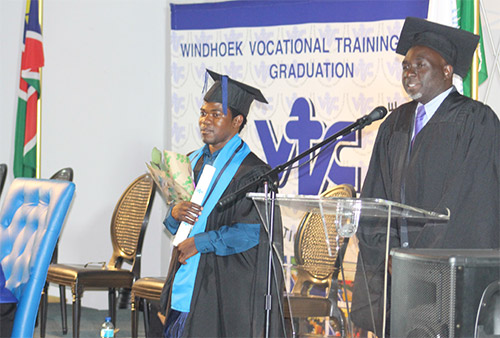Andreas Thomas
WINDHOEK – Young inventor and innovator Simon Petrus says he still harbours ambitions of inventing electronic items, despite the lack of assistance for talented youth in Namibia.
Petrus gained public attention when New Era wrote about his invention of a cardless cellphone which enables one to make calls without credit some six years ago.
Despite unfulfilled promises, he managed to buttress his in-born talent with a formal qualification in electronic engineering.
Recently, he was conferred with a national diploma in general electronics at the Windhoek Vocational Training Centre (WVTC)’s joint graduation ceremony.
Petrus was among 420 trainees conferred with various national certificates after completing their training.
They were part of over 963 trainees who successfully completed their training at the WVTC during the period from June 2019 to June 2023. The event was the first of its kind by the WVTC.
Petrus, whose training was completed in 2020, said it had given him a deep understanding of electrical systems and digital technologies.
“Finally, I managed to finish my studies. It was a big opportunity for me to study at the WVTC, and it has greatly contributed to my in-born talent for electronics,” he beamed.
He said he is working on more projects which will be quite interesting for the nation.
Although it was made known at the graduation that he was developing the idea of a self-powered television, Petrus was not willing to discuss the project. He stated that there are those who want to manipulate him.
“At the moment, I can’t really say what I am working on. I would rather say I have a better project which is quite interesting, compared to the project I have done before, which is a phone that works without credit,” he added.
Petrus said he is still unemployed, though he did his practical training at NamWater.
“There, I was doing telecommunications in different fields. Because if you have to control water in remote places where you don’t need to go, you just have to work on it remotely,” he said.
“In general, I can do any wiring. I can read any standard wiring, for example, if we have to wire a house or install any telecommunications or IT systems. So, that is the type of work I can do in general,” he noted.
The innovator, who grew up in a village near Okongo in the Ohangwena region, said he still uses his cardless cellphone, which he said he cannot patent because it is deemed illegal.
Because of technical issues related to the telecommunications system, the prototype cannot be patented.
“I’ve been attempting to patent this project, but I’m failing in some way. I don’t know how to go about it. I also did not get the right information, or someone to direct me where to go,” he continued.
Petrus is surviving on small jobs like fixing televisions, cellphones and radios, or installing electrical systems in homes.
“At the moment, I have nothing much. But I want any assistance from anyone to sponsor my further studies. I still want to study IT and electronics,” he appealed.
Nonetheless, he remains grateful to the Sam Nujoma Foundation and Erongo Marine Enterprises (EME), which enabled him to complete his education.
“Petrus’ inventive spirit and natural talent are a remarkable example of the innovative nature and potential of young people in Namibia, which needs to be supported in the interest of the future of our country,” said Martha Uumati, the managing director of EME.
“As EME has walked a path with him over the past years and also got to know him better on a personal level, we consider it an absolute privilege to have given this young genius the opportunity to study and further pursue his dreams. We are extremely proud of him,” she added.
Uumati likewise spoke of the need for the corporate sector to assist talented young Namibian innovators.
“Our country’s future prosperity is driven by the youth, who constitute nearly 37% of our population. If public and private entities fail to recognise and support young Namibian talent, we are failing the future of our country. By empowering young innovators, we are also giving them the opportunity to create more employment for others,” she observed.
-NAMPA
Caption:


